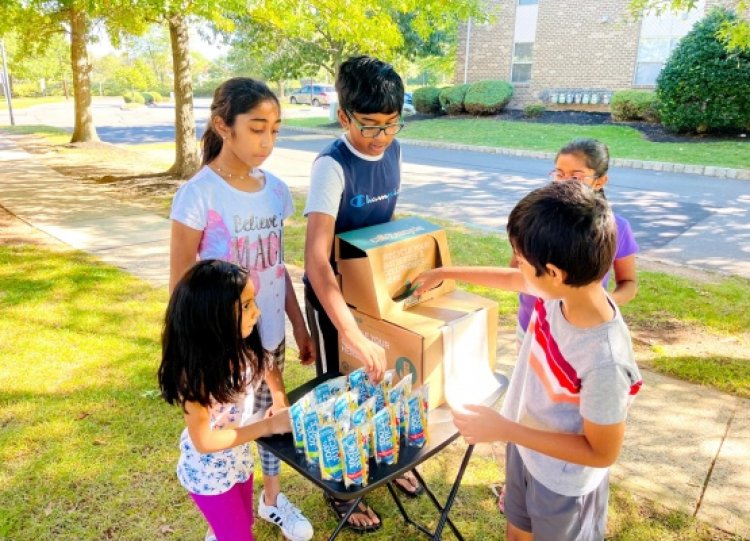Student social good startups collect $95K in T-Mobile competition
A diverse collection of students with big ideas will split about $95,000 in prize money after competing in T-Mobile’s Changemaker Challenge. Now, $5,000-10,000 may not sound like a lot to companies pulling in tens of millions, but for a kid just starting out, it could be the difference between pursuing and abandoning a passion project. […]

A diverse collection of students with big ideas will split about $95,000 in prize money after competing in T-Mobile’s Changemaker Challenge. Now, $5,000-10,000 may not sound like a lot to companies pulling in tens of millions, but for a kid just starting out, it could be the difference between pursuing and abandoning a passion project.
The contest is nationwide, asking young folks age 13-18 to submit their project, company, or however they like to define it, and five each in three categories are awarded $5,000. A winner from each category gets an additional $5,000 plus a pitch-off with T-Mo brass, and a chance for a final $5,000 check. You’d think they would throw another five large out there to hit $100,000 even… maybe next year.
There are plenty such competitions out there (last week was Microsoft’s Imagine Cup) and the ideas that surface in them are always refreshingly human in scale and intention.
Take the finalist MedTechConnect, for instance. Sounds like middleware for hospitals, but it’s two teenage cousins in Louisville who have now helped more than 2,000 senior citizens make vaccination and other healthcare appointments by walking them through the digital processes that might otherwise have puzzled them.
“Telehealth access is a basic human right. Solutions must be found, as telehealth will explode in the future… vulnerable people cannot be left behind,” they write. And they’re helping in a very hands-on way — volunteer work for the digital era, perhaps, but also just plain a good idea: a general “tech support for telehealth” for people who don’t have a savvy niece or nephew to consult on such things.
Just because folks like Jacqueline and Amelie aren’t yet quite at the Battlefield stage doesn’t mean we can’t applaud their initiative and insight. They do have one thing in common with many larger startups, however: a total lack of any plan for monetization. In this case however, that is probably a good thing.
Here’s the full list of finalists, by category with winners listed first (descriptions from T-Mo and the applicants themselves, links to their sweet little applications):
“Digital empowerment”:
- Safe Teens Online (Guaynabo, Puerto Rico) A global, youth-led peer-to-peer initiative that educates teenagers on online privacy and safety, encouraging inclusivity, safe habits, and emotional well-being.
- Bridge the Gap Initiative (North Royalton, Ohio) A student-run organization designed to help senior citizens navigate the digital world by teaching them valuable skills like texting and video calling using their smart phones.
- STEM for the South Bronx (Bronx, N.Y.) A high school robotics team with a vision to create an education center that is open to the public to explore the world of STEM.
- Scholars Program (Fairfax, Va.) An organization whose goal is to expand STEM education and STEM opportunities for minority groups underrepresented in the field.
- MedTechConnect (Louisville, Ky.) A group working to provide technical and personal support to ensure senior citizens are informed about and have access to vaccinations and basic healthcare technology.
“Equity in Action”:
- MiSendero (Santa Barbara, Calif.) MiSendero works to meaningfully integrate Latin American English learners into their school communities by facilitating mutual learning experiences for all students.
- Books N Bros (St. Louis, Mo.) A virtual and in-person book club founded to amplify African American literacy and uplift stories with Black and Brown characters to encourage more diversity in books.
- AUesome (Sunnyvale, Calif.) A therapy kit and a digital app designed for parents, educators, and treatment centers to support children on the autism spectrum.
- Dorothy’s Calculator (Los Angeles, Calif.) A website that curates informational resources on gender identity and offers support spaces for trans and nonbinary youth in the greater LA area.
- Signisa (Dobbs Ferry, N.Y.) An organization working to develop an AI-powered sign language learning application offering free, accessible courses.
“Thriving Planet”:
- Tobelli (Aurora, Ill.) Biodegradable food packaging that repurposes the cellulose found in tobacco to create a thin, safe material to help reduce waste.
- STAR’s Food Sovereignty Project (Leupp, Ariz.) An effort to expand local gardens and teach community members how to grow and prepare their own meals and help offset food insecurity throughout the Navajo Nation reservation.
- Recycle My Battery (Edison, N.J.) A non-profit working to reduce the environmental impact of batteries by installing free-to-use recycling bins in public locations throughout their community. (Pictured at top)
- Open Source Autonomous Boat (OSAB) (Portland, Ore.) OSAB is working to design and build small autonomous vessels powered by solar energy with the purpose of monitoring and protecting ocean, river and lake environments and ecosystems.
- FYDER (San Antonio, Texas) An effort to recycle plastic bulk bags into flexible, durable 3D printer filament to extend the life of otherwise discarded materials.
Some of these are pretty legit. Feel free to look me up when that pre-seed round hits, all.







